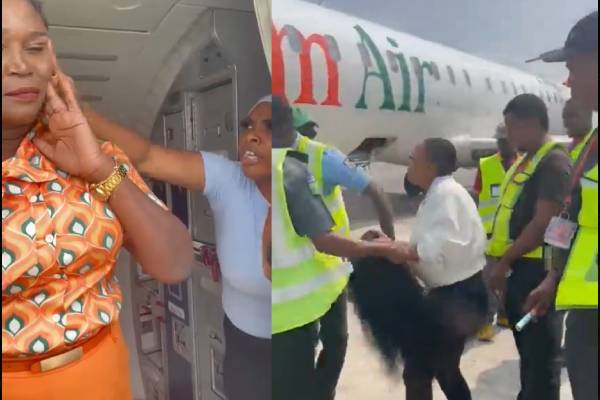Now Reading: Comfort Emmanson: 5 Reasons the Ibom Air Passenger Sue FG ‘N500bn’ Over Alleged Aviation Impunity
-
01
Comfort Emmanson: 5 Reasons the Ibom Air Passenger Sue FG ‘N500bn’ Over Alleged Aviation Impunity
Comfort Emmanson: 5 Reasons the Ibom Air Passenger Sue FG ‘N500bn’ Over Alleged Aviation Impunity

In a country where passengers often endure flight delays, arbitrary cancellations, and poor service without recourse, one woman’s bold action is shaking the aviation establishment. Comfort Emmanson,
 a passenger of Ibom Air, has taken the Federal Government and key aviation stakeholders to court, demanding an unprecedented ₦500 billion in damages.
a passenger of Ibom Air, has taken the Federal Government and key aviation stakeholders to court, demanding an unprecedented ₦500 billion in damages.
Her suit doesn’t just question how one passenger was treated, it exposes what many Nigerians call a culture of aviation impunity, where regulations exist but enforcement is selective. From alleged discriminatory treatment to systemic neglect, Emmanson’s case could become a landmark precedent in passenger rights and aviation reform.
Here are the five major reasons behind her decision to sue.
1. Alleged Unequal Treatment and Bias

One of the central planks of Emmanson’s suit is the claim that she was unfairly singled out while others, especially powerful individuals, faced no repercussions.
For example, public outcry followed reports that a popular entertainer who allegedly disrupted flight operations faced no arrest, prosecution, or sanction. Yet, Emmanson was swiftly penalized and subjected to sanctions by airline operators.
This double standard where the influential are celebrated while ordinary Nigerians face the hammer highlights what her legal team describes as institutional bias. In a country where equity before the law is enshrined in the Constitution, Emmanson’s case resonates with millions who feel powerless against entrenched privilege.
2. Violation of Passenger Rights

The Nigerian Civil Aviation Regulations outline specific rights for passengers, including timely information, fair treatment, and compensation for disruptions. But in practice, these rights are often ignored.
According to the Nigerian Civil Aviation Authority (NCAA), passengers should be protected against discrimination and unfair sanctions. Yet Emmanson’s legal team insists her rights were trampled, as she became the “scapegoat” in an incident that should have been managed with fairness and transparency.
This raises bigger questions: How many other Nigerians have quietly endured violations without legal recourse? And what does it say about accountability in an industry that generates billions in annual revenue?
3. Emotional and Reputational Damage: Comfort emmanson
Beyond the legalese, Emmanson is also claiming for the psychological toll and reputational harm she suffered. Being publicly labeled as a disruptive passenger, then subjected to a ban that was later reversed, has real consequences in a society where social reputation is currency.
Studies by the World Bank on consumer rights show that reputational damage can have severe financial and emotional effects, especially in developing economies where stigma carries weight.
Emmanson’s demand for ₦500bn is not just about numbers it symbolizes the intangible losses passengers suffer when powerful institutions act without accountability.
READ ALSO: Comfort Bob: The Untold Story Behind Her Lagos Airport Arrest
4. Aviation Safety and Governance Concerns

The lawsuit also underscores broader concerns about aviation governance and safety oversight. Nigerians vividly remember the painful history of aviation mishaps in the early 2000s, many linked to regulatory lapses. While safety has improved, questions remain about whether rules are applied evenly.
When passengers perceive selective enforcement or impunity for the powerful, it erodes trust in both airlines and regulators. This is dangerous not just for customer satisfaction, but for national safety standards.
According to IATA (International Air Transport Association), weak enforcement of aviation laws in Africa costs the continent over $1.6 billion annually in inefficiencies and safety risks.
By suing, Emmanson highlights a truth many Nigerians whisper daily: trust in the system is broken.
5. Setting a Legal Precedent for Accountability
Perhaps the most far-reaching reason for this lawsuit is its potential to establish a judicial precedent. If the court upholds Emmanson’s claims, it could open the floodgates for other Nigerians to seek redress when their rights are violated by airlines or regulators.
Legal history shows that landmark cases often come from ordinary citizens taking extraordinary steps. From Niger Delta oil spill compensations to consumer rights in telecoms, Nigerian courts have, at times, forced institutions to behave better.
A successful outcome for Emmanson could ignite a new era of accountability in Nigeria’s aviation sector, where impunity is replaced with fairness, transparency, and consumer protection.
Tropical Implications for Nigerian Aviation
This lawsuit isn’t just about one woman or one flight it’s about trust in Nigeria’s skies. With Ibom Air, Air Peace, and other airlines expanding, Nigeria positions itself as a regional aviation hub. Yet no matter how many aircraft are purchased or terminals renovated, growth will remain unsustainable if passengers feel exploited.
The World Bank has long emphasized that sustainable aviation growth requires consumer protection as much as infrastructure. For Nigeria, Emmanson’s case could serve as the tropical storm that cleanses a painful disruption that forces the industry to reset.


